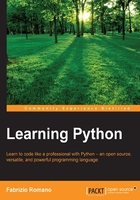
Mutable or immutable? That is the question
A first fundamental distinction that Python makes on data is about whether or not the value of an object changes. If the value can change, the object is called mutable, while if the value cannot change, the object is called immutable.
It is very important that you understand the distinction between mutable and immutable because it affects the code you write, so here's a question:
>>> age = 42 >>> age 42 >>> age = 43 #A >>> age 43
In the preceding code, on the line #A, have I changed the value of age? Well, no. But now it's 43 (I hear you say...). Yes, it's 43, but 42 was an integer number, of the type int, which is immutable. So, what happened is really that on the first line, age is a name that is set to point to an int object, whose value is 42. When we type age = 43, what happens is that another object is created, of the type int and value 43 (also, the id will be different), and the name age is set to point to it. So, we didn't change that 42 to 43. We actually just pointed age to a different location: the new int object whose value is 43. Let's see the same code also printing the IDs:
>>> age = 42 >>> id(age) 10456352 >>> age = 43 >>> id(age) 10456384
Notice that we print the IDs by calling the built-in id function. As you can see, they are different, as expected. Bear in mind that age points to one object at a time: 42 first, then 43. Never together.
Now, let's see the same example using a mutable object. For this example, let's just use a Person object, that has a property age:
>>> fab = Person(age=39) >>> fab.age 39 >>> id(fab) 139632387887456 >>> fab.age = 29 # I wish! >>> id(fab) 139632387887456 # still the same id
In this case, I set up an object fab whose type is Person (a custom class). On creation, the object is given the age of 39. I'm printing it, along with the object id, right afterwards. Notice that, even after I change age to be 29, the ID of fab stays the same (while the ID of age has changed, of course). Custom objects in Python are mutable (unless you code them not to be). Keep this concept in mind, it's very important. I'll remind you about it through the rest of the chapter.